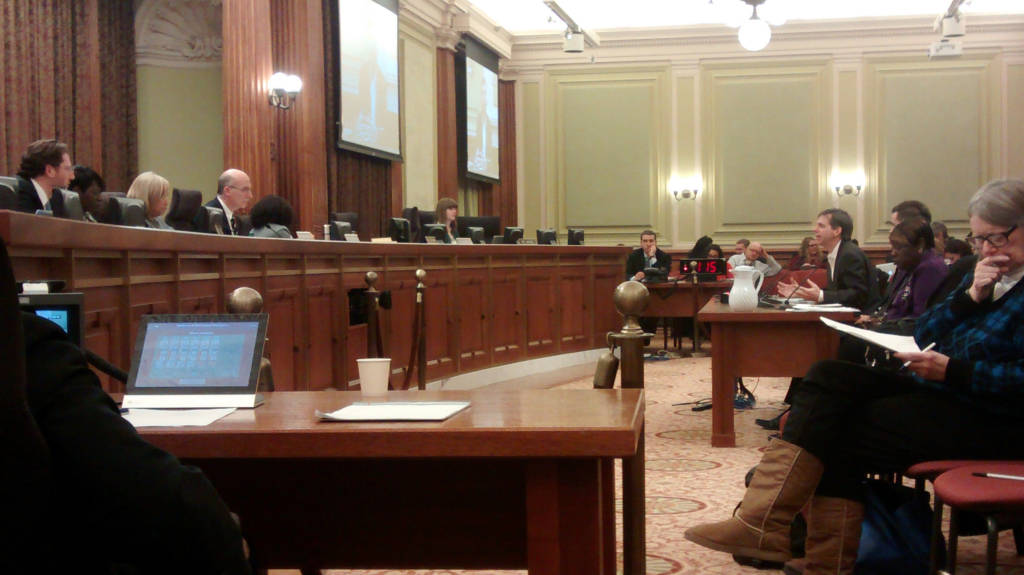On January 30, 2015, the District of Columbia City Council held a joint public hearing with the Committee of the Whole and the Committee on Health and Human Services to discuss the causes and solutions to homelessness in Washington, D.C.
“It appears the issue has gotten worse,” Council Chairman Phil Mendelson said.
Health and Human Services Committee Chair and Ward 7 Councilmember Yvette Alexander shared several anecdotes from her experience on this year’s Point-In-Time count, a survey of homelessness in the area, to illustrate the many challenges homeless residents face. She supported Mayor Bowser’s goal that there be no homeless families in the District in 2015 and committed to providing more services for homeless people. Ward 1 Councilmember Brianne Nadeau emphasized prevention and collaboration, conceding that District services to the homeless are insufficient.
At-Large Councilmember David Grosso voiced that $8.7 million promised from city government had not made it to the programs it was supposed to support. He also called for year-round, 24 hour shelters. Grosso stressed not waiting till the next fiscal season.
“We can end [chronic homelessness] sooner than 2025,” he said. “I want to know what you need. I want to give it to you now.”
Witnesses and council members alike stressed the problem of domestic violence leading to homelessness and occurring within the homeless community. Forty-four percent of homeless families reported a history of domestic violence, according to Karma Cottman, Executive Director of the D.C. Coalition Against Domestic Violence.
Acting Director of the Department of Human Services Laura Zeilinger suggested a systematic approach to providing access to the affordable housing supply: shifting from an array of programs that operate on their own to a coordinated system.
“I’ve seen affordable housing go like rapid fire back to the market price.” Grosso said, “People have offered us different parts of the solution and it’s really our job to pull this together.”
The Rapid Re-Housing Program, which moves homeless families out of shelters and into temporary apartments, was mentioned as a solid tool for helping people get a chance at housing. Rapid Re-Housing places people in rented apartments and helps to pay the rent for four months and up to a year. But a few witnesses, including Street Sense’s Reggie Black, contested that this wasn’t long enough.
Shirley Horng, a representative of the Legal Aid Society of D.C., spoke specifically about the flaws within the Rapid Re-Housing Program. The Legal Aid Society has handled many eviction cases that resulted from the program. She said most people who go through Rapid Re-Housing are worse off for participating in the program because they can’t get a job in four months, they can’t pay the rent, they get evicted, they go to court, and they end up with the eviction on their personal record.
“Community witness” John Ross, homeless himself, said that if people had more windows of opportunity, then that would diminish homelessness. Most community witnesses, unaffiliated with an organization, were people experiencing homelessness. But many who had signed up to testify were not present when their names were called.
Vanessa Wellbery of Hyacinth’s Place suggested that Permanent Supportive Housing is the solution to homelessness in D.C., but admitted that different people are suited to different housing options and no single solution is always better than the others.
Most people voiced their support for rapid re-housing, including Kristy Greenwalt, Bowser’s new homeless czar. Greenwalt suggested that this option was just being given to the wrong set of people. She added that D.C. spends a vast amount of taxpayer dollars on managing homelessness.
“This is a community that is a thousand units short of affordable housing,” Greenwalt said. “There is a cost to systems change, but if done right it is only a one-time cost.”
Rapid Re-hHousing seems to be one of the least costly housing tools–cheaper than Permanent Supportive Housing and shelters. Some families and individuals don’t need the support of Permanent Supportive Housing, according to Greenwalt.
Kate Coventry, Policy Analyst at the D.C. Fiscal Policy Institute, claimed that a number of families had been wrongfully denied housing and blamed this failure on the lack of staff who can place homeless families. She said there was too much pressure on too few staff so they made incorrect decisions. Mendelson then repeated his concern that homelessness is continuing to rise in D.C., while it is going down in surrounding areas and other major cities. Coventry suggested that the numbers are obscured by those who are not counted. Mendelson, through questioning witnesses, brought up the issue of homeless people moving into D.C. to receive services. Several witnesses contested the idea.
Deborah Johnson, from the Youth Development Model, discussed the problems that homeless girls and women face, especially young mothers. She said many of them are homeless for lack of reproductive health education.
Grosso voiced a different concern: D.C.’s incarceration system. He claimed there are a lot of people in jail who are homeless and mentally ill. Grosso wants to work on the preservation of affordable housing. He believes the more you build, the cheaper the rent will become.
“An end to homelessness doesn’t mean that no one will ever experience a housing crisis again,” Zeilinger said. “An end to homelessness means that we have a systematic response so that it’s rare and brief.”








